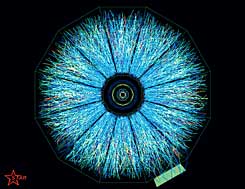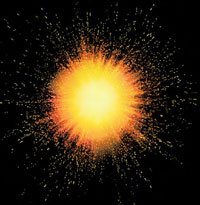The race to create the primordial matter that took place for a split second after the big bang is accompanied by a prestige war between two leading research centers. Are American scientists delaying the announcement of the creation of a "quark and gluon plasma" because it would confirm a previous discovery

Traces of particles emitted by the collision of two gold ions at the Brookhaven particle accelerator. The creation of a "quark and gluon plasma" may be one of the most important discoveries in science. Photo: Brookhaven Lab
Direct link to this page: https://www.hayadan.org.il/brookhavencern.html
The large convention center in the business district of Oakland, California, was transformed in January into the Elsinore of nuclear physics. The ghost that appeared, disappeared and reappeared during the scientific conference was not the ghost of a murdered king, but the shadow of an ancient substance with a strange name: quark and gluon plasma (QGP).
 The Oakland drama, like the Shakespearean one, involved not only a clash between great powers, but also what some of the participants interpreted as acts of betrayal and revenge. At the center of the event were two important giant laboratories, eagerly pursuing what may be one of the most important discoveries in science.
The Oakland drama, like the Shakespearean one, involved not only a clash between great powers, but also what some of the participants interpreted as acts of betrayal and revenge. At the center of the event were two important giant laboratories, eagerly pursuing what may be one of the most important discoveries in science.
One of the two laboratories, the Brookhaven National Laboratory from the USA, presented a "Hamletian" show when it raised many doubts as to the meaning of its own findings. The lab's scientists refused to admit that they created the plasma, even though physicists working in the field agree that the lab succeeded in its mission.
"Personally, I wouldn't bet that we didn't succeed," said Dr. Thomas Kirk, Brookhaven Laboratory associate director of high energy and atomic physics. But the doubts he still had, as well as the doubts of other researchers in the lab, were soon put on display. "People have been fooled before," Kirk said in a menacing tone. For now, he added, the lab will refrain from making an announcement.
The strange occurrence at the conference in Oakland illustrated how difficult it is to announce an important discovery in an era of collaboration between hundreds of scientists and strict and byzantine regulations for announcing discoveries, each of which can cause the movement of hundreds of millions of dollars intended for research.
The plot of the story is quite simple. Since June 2000, Brookhaven Laboratory's Relativistic Heavy Ion Accelerator has been "bombarding" nuclei of gold atoms at each other at speeds close to the speed of light. The goal was to cause strange but fundamental particles called quarks and gluons to come out of the protons and neutrons of the gold nuclei, where they are usually trapped, and create a "soup", plasma.
Because the plasma of quarks and gluons last existed a few millionths of a second after the Big Bang, the big explosion believed to have given birth to the universe, this material is among the most sought-after materials in scientific research.
Brookhaven scientists observed an impressive array of evidence, albeit indirect, that the plasma was created in their accelerator. Powerful particle jets disappeared into the plasma-like material, as expected; And almond-shaped lumps of the material spread in exactly the same strange patterns predicted by the theories. "The proof of the creation of the plasma of quarks and gluons is unequivocal," said Dr. Miklos Giolasi, a theoretical physicist from Columbia University.
But Brookhaven's supposed success was accompanied by what researchers at the lab considered a cruel stroke of fate. In February 2000, a few months before they began to accelerate gold nuclei in Brookhaven, a similar, albeit less powerful, experiment was completed at CERN in Geneva, the leading laboratory in the field of particle physics in Europe.
The nuclei that were bombarded one by one in the experiment conducted at CERN were not of gold but of lead. CERN scientists - including Dr. Reinhard Stock, a physicist from the University of Frankfurt, and Dr. Johanna Stahl from the University of Heidelberg - decided that the findings in their hands provide proof that they created "free" quarks, that is, quarks that began to leak out of the protons and neutrons in the lead nucleus. It was not yet the long-awaited plasma of quarks and gluons, but as Dr. Stachel said in 2000, "the findings indicate without a doubt that this is a new state of matter." CERN scientists decided to announce their discovery.
For Brookhaven scientists, whose $600 million accelerator was built in hopes of finding the quark and gluon plasma, something was rotten in the realm of European particle physics. The American scientists hurled at their colleagues one of the most serious curses imaginable in the world of research: they accused them of being politically motivated.
"What upset people in our lab was that their proof was not convincing enough," said Dr. Thomas Ladlam, a Brookhaven physicist. Dr. William Zach, a physicist at Columbia University who serves as a spokesman for more than 400 scientists and engineers working at Brookhaven, said the CERN announcement "confused more than it shed light on the whole thing."
Those words hurt like knives. According to Dr. Stock, he was aware that the timing would not please the American scientists. "They just started a half-billion-dollar operation, and here we are telling them, 'Bye-bye, we stole your child,'" Stock said.
CERN scientists responded to the criticism with stoic calm. At the same time, as the months passed, the Brookhaven scientists began to gain a lot of attention when they successfully operated their accelerator and began to collect some very impressive data. But then something happened that gave the CERN scientists great pleasure: the new data collected at Brookhaven hinted that they, the CERN people, were indeed on the verge of creating a plasma of quarks and gluons, just as they claimed.
As the evidence for the creation of the plasma at Brookhaven grew stronger, and in the meantime no evidence was found that disproved CERN's claim, the European scientists began to think that the delay of the Brookhaven scientists was not solely due to scientific caution. If Brookhaven were to announce the discovery now, Dr. Stachel said, "the people who were very critical of our discovery would have to swallow their words."
Brookhaven scientists obviously disagree with this claim. They say that the reason for the delay is their desire to collect more data to be sure that the plasma does not find its way into the dustbin of scientific discoveries, which in retrospect turn out to be incorrect. "CERN is not part of our discussions, it's already over," said Dr. Kirk. According to him, there is only one thing that is important to consider when announcing a discovery: "It must be completely immune to criticism."

2 תגובות
Science today is not collaborative for one reason or another, so everyone fights each other for credit instead of developing the subject further...
I don't understand what the quarrel is about? The meanings of having an elementary material state as a quark and galvanic plasma is a huge step on the way to understanding the universe and matter in general.